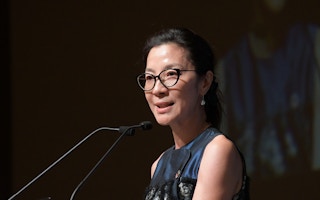The United Nations Development Programme (UNDP) on Thursday launched its gender equality certification programme for businesses in Asia Pacific, with UNDP Goodwill Ambassador Michelle Yeoh calling on the region’s governments to waste no time in adopting the initiative.
UNDP’s Gender Equality Seal Programme for Public and Private Enterprises was launched in 2009, and sets specific standards for gender equalities that companies must meet to get certified.
The standards address six critical areas: Gender-based pay gaps, women’s roles in decision-making, work-life balance, women’s access to jobs in more dynamic and traditionally male-dominated sectors of the economy, ending workplace sexual harassment and using non-sexist communication.
The programme was pioneered in Latin America and has seen more than 1,400 companies attain the seal since its launch. Now available globally, the certification programme will be adopted and implemented by different governments with UNDP’s support.
Speaking at the Responsible Business Forum on Sustainable Development at the Sands Expo and Convention Centre in Singapore, Yeoh urged leaders in Asia Pacific to adopt the programme.
“Inequality abounds in schools, workplaces, in government and beyond,” said the actress. “That is why we need the Gender Equality Seal Certification Programme for Public and Private Enterprises.”
She added: ” If we do not capture the energy and creativity of women we cannot achieve the full potential of our economies and societies.”
Gender inequality is a pressing issue in Asia, with women 70 per cent less likely to be in the labour force than men. In South Asia, only 15 per cent of the women who work are salaried workers, with the rest operating in the informal economy. This often entails low pay and insecure, if not dangerous, working conditions.
The region also fares poorly on women’s leadership; only 19 per cent of parliamentarians in Asia are women, and in the corporate world, a tenth of Asian companies have no women at senior management level. Some 26 per cent of firms in the region have no women on their boards.
“
Businesses which acquire this certification will establish themselves as forward-thinking employers with an edge in recruiting, retaining and making the most of female talent.
Jolene Tan, head of advocacy and research, Association of Women for Action and Research
Similar inequalities exist globally, and the UN has sought to tackle them by making gender equality one of its 17 Sustainable Development Goals (SDGs). The list of targets, which the global community aims to meet by 2030, includes eradicating poverty and hunger and addressing climate change, among others.
Haoliang Xu, UN Assistant Secretary General and UNDP Regional Director for Asia and the Pacific, noted that “the Gender Equality Seal is one avenue for closer collaboration with the private sector, which is crucial for the achievement of the SDGs”.
To attain the seal, companies must demonstrate their commitment to ending gender inequality in the workplace. This is a multi-step process that begins with developing a written commitment to gender equality. It also involves developing a company-wide policy and action plan to meet the certification requirements and conducting an external audit to prove progress.
Raquel Lagunas, UNDP senior advisor on gender mainstreaming, noted that by adopting gender equality standards, the private sector can ensure equal opportunities and economic empowerment for women, create inclusive work environments and help achieve some of the SDGs. In return, the programme can also lead to improved productivity and employee engagement, reduced absenteeism and a better public image for certified firms.
The Latin American companies that have obtained the certification can attest to this. Chile’s national copper mining company, Codelco, for example, in 2009 began hiring women miners, an anomaly in a heavily male-dominated sector. As a result, it reported a better work environment for all miners, as well as higher productivity and efficiency rates.
Similarly, Colombian national family compensation fund CAFAM implemented a policy of equal pay for equal work, and as a result, reported benefits such as attracting and retaining a greater diversity of talent, better job satisfaction among staff, and increased competitiveness.
As UNDP seeks to replicate these results in Asia Pacific, Xu noted that Malaysia has already agreed to explore introducing the certification. The agency is trying to identify other countries that it can expand the programme to next year. It will help governments develop the national certification standards, as well as to identify advisors and auditors to implement the programme.
Jolene Tan, head of advocacy and research at Singapore-based non-profit Association of Women for Action and Research (AWARE), told Eco-Business that if Singapore stepped up to adopt the UNDP seal, it “can demonstrate leadership in building a global hub that takes gender equality—and the full potential of women’s talent—seriously”.
Tan added that under its obligations to the Convention on the Elimination of all Forms of Discrimination Against Women, an international treaty, Singapore can also fulfil its obligation to prove a systematic effort by the state to establish gender equality as a priority at all levels for businesses, by adopting the seal.
On their part, companies can take several proactive measures including setting targets for recruiting women in senior positions, making sure that women are not penalised for taking family leave, and employing best practice strategies to prevent discrimination and harrassment in the workplace, said Tan.
“Businesses which acquire this certification will establish themselves as forward-thinking employers with an edge in recruiting, retaining and making the most of female talent—which is very valuable in Singapore’s tight labour market,” she said.
But, she added, “ultimately, governmental action—such as comprehensive anti-discrimination legislation—would have the biggest impact”.

















